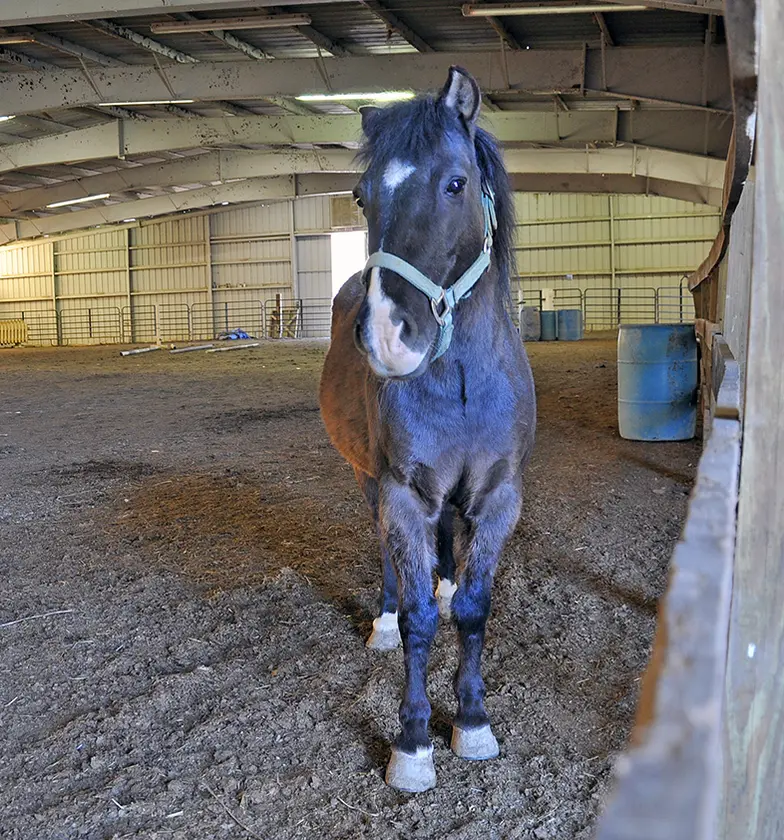Managed-Admission Centers Provide Options for Equines, Owners in Need

Many horses have multiple homes throughout their lifetimes. Occasionally, these natural transition points between homes can be times of vulnerability, especially if a horse owner’s life or financial circumstances have changed. Compounding the challenge, struggling horse owners often don’t know where to turn for help. The ASPCA is committed to changing the fate of these horses by providing a safety net of support for horses and their owners.
The Evolution of the ASPCA’s Equine Managed-Admissions Work
The ASPCA Regional Support Center Pilot program, launched in 2018 in the Dallas/Fort Worth (Texas) area, with a second pilot initiated in 2019 to service the Oklahoma City (Oklahoma) area. Both pilots featured collaborative, mobile teams, including a local veterinary partner, who assessed the horse(s) at the owner’s request. Based on that assessment, and in partnership with the owner, the pilot programs provided one of the following options:
- Subsidized veterinary care when it’s best for the horse to stay at home with the owner
- Compassionate euthanasia if needed to prevent suffering
- Safe relinquishment, including any necessary medical care or training, before placement in a loving new home
Learnings from the Texas and Oklahoma Pilots
Here are the key takeaways about relinquishment gleaned from the pilots.
1. The top reasons the owners gave for relinquishing their horse were:
- Human health problems
- Age of the owner
- Moving
- Financial issues (such as job loss)
- Changes in expectations or desires regarding the equine
Oftentimes horse owners are not in financial trouble—they simply are no longer physically capable of caring for their horses and have no one to help them.
2. Most people relinquishing an animal had been thinking about it for at least six months — with many considering rehoming for over a year. All this time in limbo can be detrimental to horses’ health if they have medical or behavioral needs that go unaddressed or worsen during this time, causing them to languish needlessly. Delaying care can also increase the resources needed to successfully re-home horses.
These learnings indicate owners care about their animals and deserve compassion, not judgment. The animal welfare community simply needs to help them sooner.
The Equine Transition and Adoption Center
In late 2021, the Regional Support Center evolved into the Equine Transition and Adoption Center Pilot, an expanded program more broadly supporting the region’s horses with safety net and rehoming services across Oklahoma. The Equine Transition and Adoption Center includes additional staff focused on training and adoption.
The Equine Transition and Adoption Center pilot augments the mobile services with leased facilities near the Oklahoma City area where a training and behavior specialist works with the relinquished horses to ready them for new homes. The pilot program is testing ground-breaking, humane training methods to build a replicable blueprint for retraining and rehoming horses who are minimally socialized or have behavioral challenges that make an adoption placement challenging.
An adoption specialist works alongside the training and intake teams to test methods for efficiently finding each a loving home with the goal to design and test specific strategies for marketing horses who’ve traditionally taken longer to be adopted. These learnings, along with the research gathered by the training team, will be shared back with the equine welfare community to elevate and expand equine adoption efforts nationwide.
How to Help
- Direct horse owners in need to the ASPCA Equine Transition and Adoption Center.
- Share the listings of adoptable horses nationwide at myrighthorse.org.
- Equine welfare organizations wishing to provide similar safety net services in their communities should email the ASPCA Equine Welfare team.
